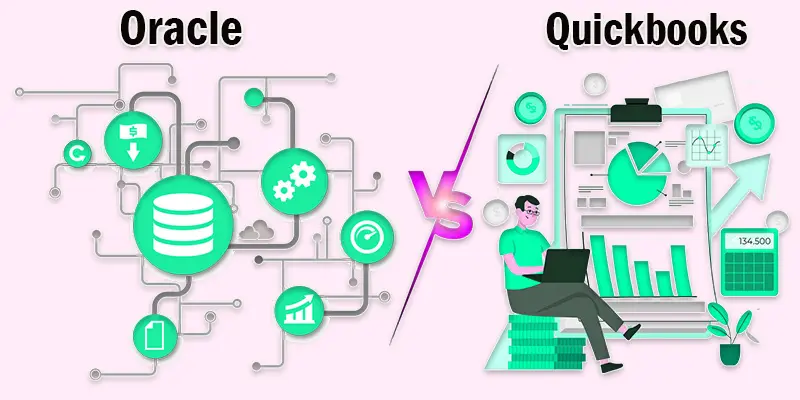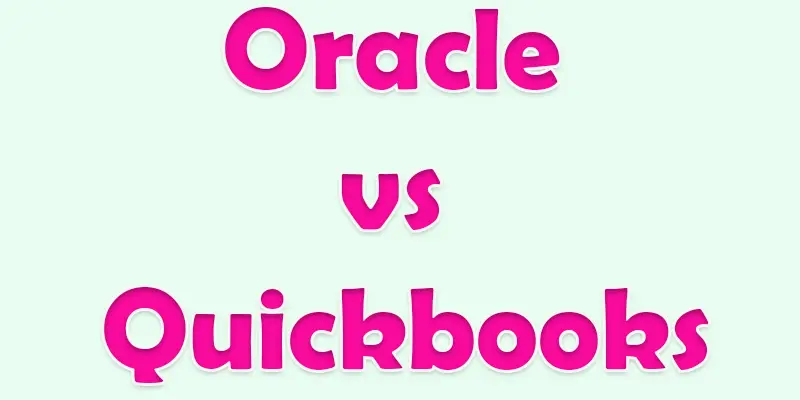Oracle vs QuickBooks | A Simple Guide for Businesses
Published: 17 May 2025
QuickBooks vs Oracle for Small Business Accounting
QuickBooks vs Oracle is a hot topic for businesses choosing the right software. Did you ever feel stuck wondering which one actually fits your business? Many users struggle with tools that are either too simple or too complex for their needs. Whether you’re upgrading your system or just curious, this guide will help you compare both and make the right choice.
What is QuickBooks?
QuickBooks is a user-friendly accounting program designed for small and medium-sized enterprises. It facilitates the central tracking of income, expenses, payroll, and invoices. Many people use it to manage their daily business finances quickly and simply.
What is Oracle?
Oracle is a powerful business software used by medium to large companies. It helps manage accounting, inventory, HR, and more, all in one system. It’s great for businesses that need advanced tools and can handle more complex tasks.

Difference Between QuickBooks and Oracle
The main difference between QuickBooks and Oracle is that QuickBooks is simple and best for small businesses, while Oracle offers more advanced tools for bigger companies.
| QuickBooks | Oracle |
|---|---|
| A simple accounting software for small businesses. | A comprehensive ERP system for larger businesses. |
| Small to medium-sized businesses. | Medium to large businesses or enterprises. |
| Very easy to set up and use. | Requires training and setup expertise. |
| Basic accounting features (invoicing, payroll). | Advanced features (HR, inventory, finance, CRM). |
| Limited customization. | Highly customizable to meet specific business needs. |
| Affordable, subscription-based pricing. | Expensive pricing based on company size. |
| Cloud-based or desktop versions. | Primarily cloud-based with enterprise solutions. |
| Best for small to medium businesses. | Built for scalability in large organizations. |
| Integrates with popular tools like PayPal and Shopify. | Integrates with other Oracle software and complex systems. |
| Basic financial reporting. | Advanced, customizable reports with deep insights. |
| Basic support via chat, email, or phone. | Dedicated support with 24/7 availability. |
| Available in the cloud for easy access anywhere. | Full cloud access with secure data storage. |
| Offers a mobile app for on-the-go management. | Has a mobile app but more suited for large teams. |
| Supports multiple currencies for international clients. | Extensive multi-currency support for global businesses. |
| Basic security features. | Advanced security protocols for enterprise needs. |
| Simple, clean, and beginner-friendly. | Complex, designed for expert users and IT teams. |
| Built-in payroll features for small businesses. | Comprehensive payroll solutions with HR integration. |
| A small retail store using Quick-books for invoicing and tracking expenses. | A global manufacturer using Oracle to manage finances, HR, and inventory. |
| Minimal training needed to get started. | Requires in-depth training and expert consultants. |
| Regular updates to add new features. | Frequent updates, but may require IT teams for deployment. |
| Limited to a few users depending on the plan. | Supports hundreds or thousands of users simultaneously. |
| Cloud storage for basic data backups. | Advanced cloud storage with high scalability and security. |
Choose QuickBooks if:
- You have a small to medium-sized business.
- You need a simple, easy-to-use accounting tool.
- You don’t require complex features like inventory management or HR tools.
- Your business is just starting or doesn’t have many advanced needs.
- You have a limited budget for software solutions.
Choose Oracle if:
- You run a medium to large business with complex needs.
- You need an all-in-one solution that handles finance, HR, inventory, and more.
- You plan to scale your business and need a system that can grow with you.
- You require highly customizable features and detailed reporting.
- You have a dedicated IT team or resources to manage the software.

Conclusion About Oracle vs QuickBooks for Financial Management Solutions
When comparing QuickBooks vs Oracle, it’s clear that both offer unique benefits depending on your business needs. For small businesses or startups, QuickBooks is a more budget-friendly and user-friendly option. However, Oracle excels for larger enterprises with complex financial operations. I recommend assessing the scale and specific needs of your business to make the right choice. Ready to take your business to the next level? Choose the solution that fits best and start today.
FAQS
QuickBooks is primarily an accounting software, not a full ERP system. However, it can manage basic business functions like inventory and payroll, which are part of ERP.
Yes, Oracle offers ERP software that helps businesses manage processes like finance, supply chain, and human resources.
No, QuickBooks is owned by Intuit, a financial software company.
Oracle is owned by Oracle Corporation, founded by Larry Ellison and others in 1977.
Oracle doesn’t have a full form. It is the name of the company, derived from a code name for a project that the founders worked on.
QuickBooks remains a top choice for small businesses due to its ease of use and strong accounting features, though other options exist depending on business needs.

- Be Respectful
- Stay Relevant
- Stay Positive
- True Feedback
- Encourage Discussion
- Avoid Spamming
- No Fake News
- Don't Copy-Paste
- No Personal Attacks



- Be Respectful
- Stay Relevant
- Stay Positive
- True Feedback
- Encourage Discussion
- Avoid Spamming
- No Fake News
- Don't Copy-Paste
- No Personal Attacks





